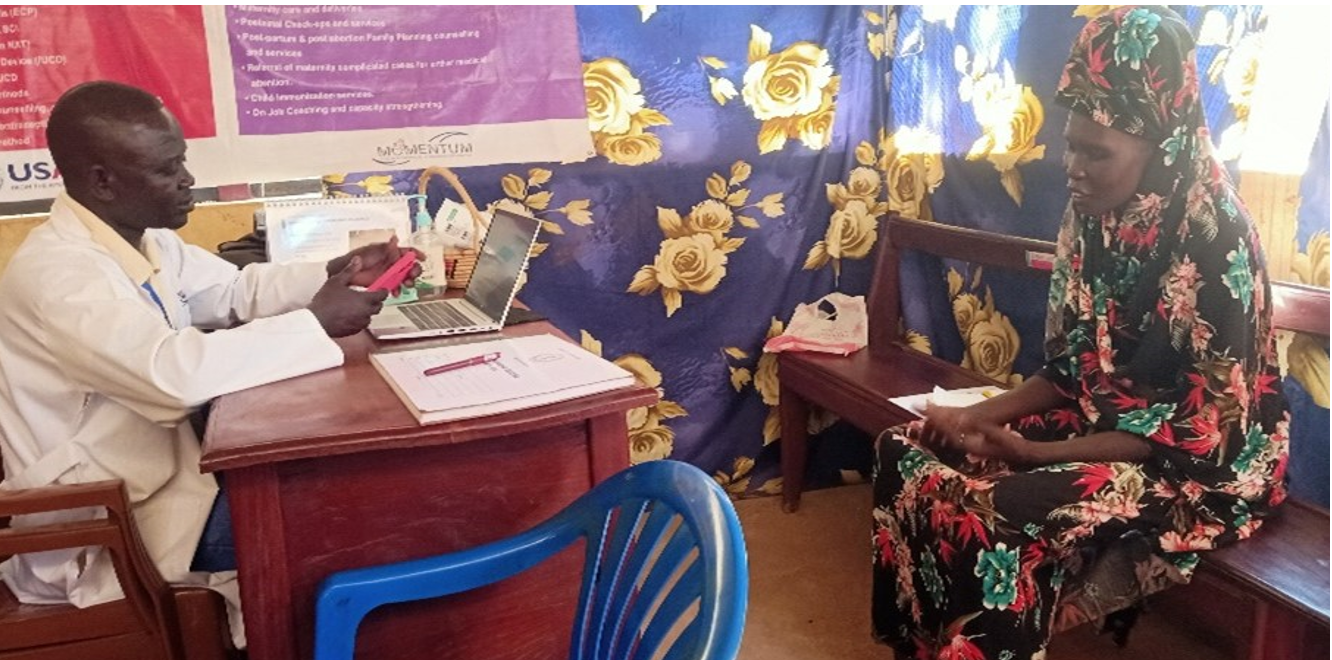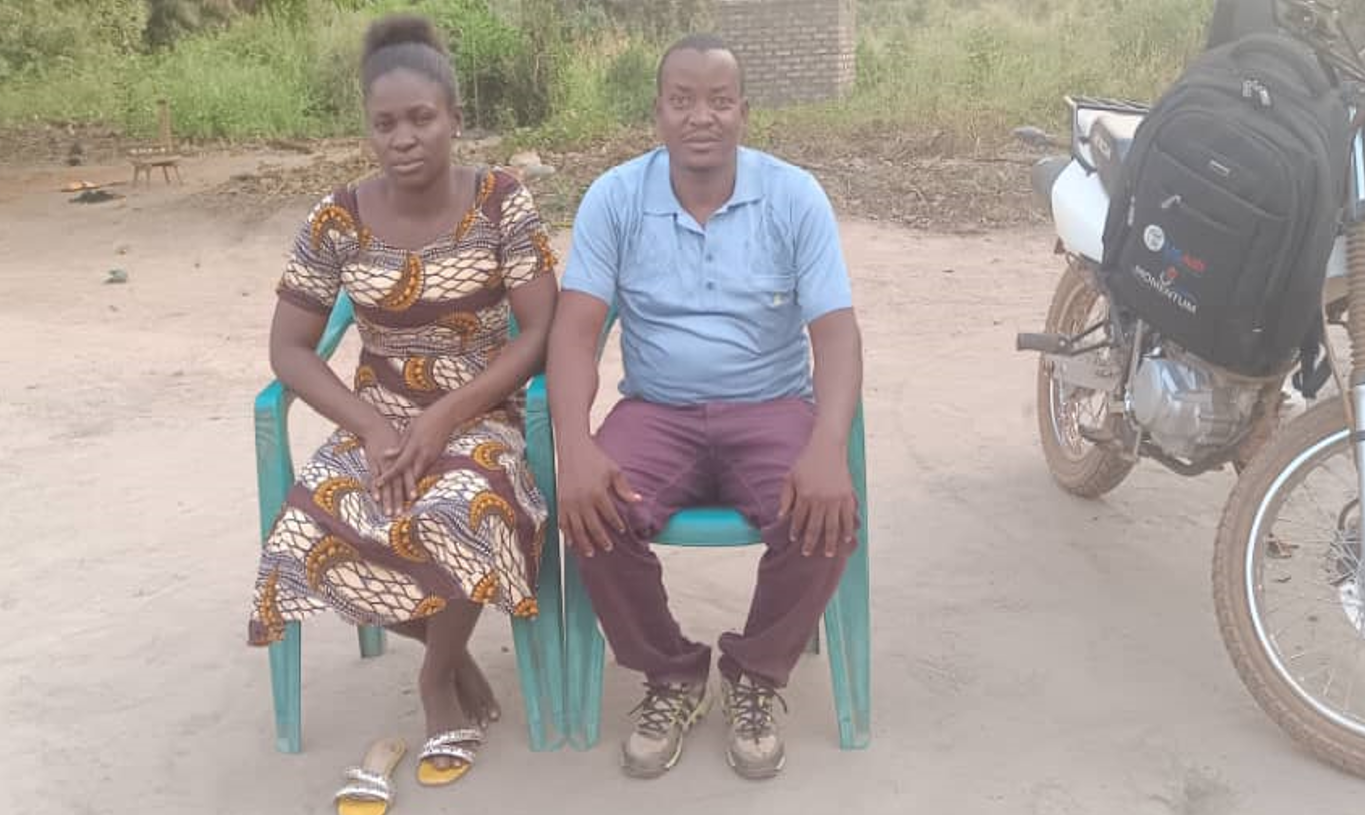Information Sharing Improves Lives in South Sudan
Published on June 3, 2024
By Kenyi Athanasius, Social Behavior Change Advisor, and Baraka Stephen, County Liaison Officer, MOMENTUM Integrated Health Resilience, South Sudan
In South Sudan, accessing voluntary family planning (FP) services can be both a blessing and a challenge. Misinformation and long-held myths—such as contraceptives can make women barren, cause cancer, or result in children having birth defects—lead many who would benefit from these services to shy away.
MOMENTUM Integrated Health Resilience strives to increase access to quality FP to help women and couples determine their desired family size and intervals between having children while also learning how to prevent unintended pregnancies. Through this planning, women can increase their opportunities for education and meaningful employment, and families can create greater financial stability, health, and resilience.

For Aker Malang Bol, a 23-year-old single mother of two living in Wau, South Sudan, making use of local FP services has given her hope that she will be able to balance her parenting responsibilities with her academic aspirations. Having completed secondary school in 2019, Aker says she longs to continue her education at a university. She dreams one day of becoming a medical doctor.
After learning about FP through a MOMENTUM awareness-raising activity in her community, Aker went to the Hai Dinka Primary Health Care Center to find out more about modern contraceptives. Initially, she opted for a three-year method but experienced concerning side effects.
Seeking an alternative, Aker returned to Hai Dinka and met with Santos Uyu Agor, a Reproductive Health Mentor who, after becoming a midwife, received additional training from MOMENTUM on various contraceptive methods. With Santos’ support and guidance, Aker made an informed decision to switch to an intrauterine device (IUD). He also put Aker’s mind at ease regarding the negative and misleading information about contraceptives circulating in her community.
Given her new knowledge about IUDs, Aker is now optimistic that she can once again consider having a relationship while also embarking on her university journey. As she explains, “Before I decided to use this family planning method, I was always so worried about getting pregnant. Now this method is helping me a lot. I can prevent unintended pregnancy while taking good care of my children, and I am hoping to continue pursuing my dreams.”
Meanwhile, in the Yambio County community of Timbiro, Josephine Naboro and her husband, Moses Karaba, had seven children after just twelve years together when Josephine learned about MOMENTUM’s FP services through radio advertisements and her visits to an antenatal care clinic. Determined to secure a better future for her family, Josephine went to the Yambio Primary Health Care Center and began using an injectable FP method. After initially experiencing appetite and weight loss as side effects, Josephine received additional counseling and switched to a long-acting method, which resolved her issues.

But when Moses found out about Josephine’s decision to use FP, he became upset and took the matter to the village chief, who happened to be a MOMENTUM-trained health worker well-versed in FP. In this case, local customary law aligned with South Sudan’s inclusive national FP usage policy as the village chief drew on his health care expertise in ruling that Josephine could use FP due to the shortness of her birth intervals, which can pose health risks to both the child and mother.
For Moses, though, the turning point came when he began attending MOMENTUM-supported health education sessions focusing on the benefits of FP to individuals, families, communities, and the nation. During these sessions, male FP champions gave testimonies on how their lives had improved through the use of FP services, and Moses was able to ask questions and get answers that dispelled the misconceptions he had heard. Soon, he realized that his and Josephine’s unplanned pregnancies were causing a financial strain and that FP was the key to a brighter, more secure future.
“Since I accepted my wife … using family planning, our family has realized love, happiness, good health, and peace of mind. We now jointly think through our family planning, and we are happy and will continue planning together to realize the dividends,” Moses said.
Since starting FP, Josephine has had more time to engage in other productive activities, resulting in personal and financial growth, and Moses had the bandwidth to find new employment, alleviating the economic burden that once weighed heavily on the family.
In their respective communities, both Moses and Aker Bol have become passionate FP advocates. While Aker urges other women to follow in her footsteps and embrace modern contraceptives, emphasizing their safety and positive impact on women’s lives, Moses encourages others, particularly fathers, to visit a health facility to learn more about FP so that they can take control of their own destinies and create a better tomorrow.

